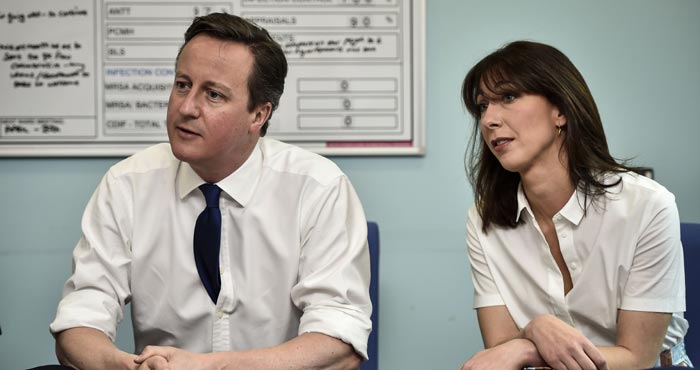British Prime Minister and Conservative party leader David Cameron and his wife Samantha Cameron speak with staff during a visit to the Salford Royal Hospital in Manchester. Cameron is still far ahead when Britons are asked to say who they think would be the best prime minister.
Reuters/London
Britain's opposition Labour Party has taken a four-point lead over Prime Minister David Cameron's Conservatives after the first TV encounter of an unusually close-fought national election, an opinion poll showed on Sunday.
The poll is a morale boost for Labour and its leader Ed Miliband, and prompted party strategists to say it showed they could win an outright majority on May 7.
Miliband's earnest personality is mocked by the country's mainly right-leaning press, and the left-wing party hopes voters will see past caricatures and warm to him during the campaign.
"As the polls this morning indicate, this is a winnable election for Labour," Douglas Alexander, Labour's campaign chairman, told the BBC's Andrew Marr Show.
"It is difficult, but it is certainly doable that we can get a majority," he added, saying he was confident Labour could increase its support in the coming weeks.
Britain's future in the European Union could ride on the outcome as Cameron is pledging an EU membership referendum.
Labour 36% Tories 32%
The poll, by YouGov for the Sunday Times, put Labour on 36%, the Conservatives on 32%, the centrist Liberal Democrats, now in coalition with Cameron's Conservatives, on 8%, the anti-EU UK Independence Party (UKIP) on 13%, and the Greens on 6%.
It also suggested, contrary to an earlier poll, that most Britons - by a margin of 49% to 34% - thought Miliband had performed better than Cameron in last Thursday's first TV encounter of the campaign.
A snap poll conducted immediately afterwards suggested Cameron had won, albeit by a slimmer margin than expected.
Cameron is still far ahead when Britons are asked to say who they think would be the best prime minister and his party enjoys a commanding lead over Labour when it comes to what it hopes will be the decisive issue of economic credibility.
Polls also show Labour struggling to stem what looks like a devastating loss of support in Scotland to Scottish nationalists who have surged since losing a referendum on independence last year. That makes it harder for Labour to win outright.
But Cameron's appearance in the first TV encounter was less assured than expected and he had to use his final debate in parliament last week to defend his surprise decision to announce he wouldn't seek a third term in power if re-elected.
Most polls in recent months have put Labour and the Conservatives neck-and-neck, though both have briefly notched up leads of up to four points only to see them swiftly evaporate.
YouGov's Joe Twyman said Sunday's poll showed the TV encounter had given Labour momentum ahead of what is regarded as the formal start of the campaign on Monday.
"The big question is whether this is a talking point or a turning point. Will they be able to make it stick and turn the momentum into sustained gains?" he said.

